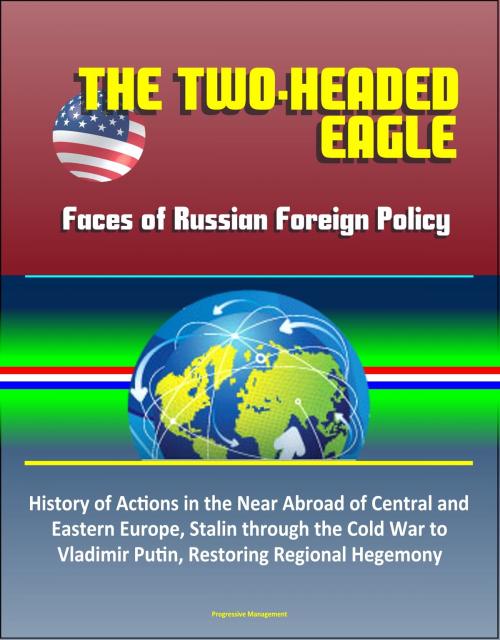The Two-Headed Eagle: Faces of Russian Foreign Policy - History of Actions in the Near Abroad of Central and Eastern Europe, Stalin through the Cold War to Vladimir Putin, Restoring Regional Hegemony
Nonfiction, History, Asian, Former Soviet Republics, Russia| Author: | Progressive Management | ISBN: | 9781370623204 |
| Publisher: | Progressive Management | Publication: | March 24, 2017 |
| Imprint: | Smashwords Edition | Language: | English |
| Author: | Progressive Management |
| ISBN: | 9781370623204 |
| Publisher: | Progressive Management |
| Publication: | March 24, 2017 |
| Imprint: | Smashwords Edition |
| Language: | English |
This excellent report has been professionally converted for accurate flowing-text e-book format reproduction. The former Soviet states in Central and Eastern Europe comprise a prominent portion of the Russian Federation's "Near Abroad." During and since World War II, these countries have alternately served as an adversary avenue of approach and a security zone for the Soviet Union. Since the end of the Cold War, these countries have remained a zone of competition and contestation between Russia and Western Europe. When the Soviet Union dissolved in 1991, just over 25 million Soviet citizens of Russian cultural and linguistic descent were displaced beyond the Russian Federation's border in newly independent states. In addition, the Soviet Union's superpower status disappeared virtually overnight. Since then, President Boris Yeltsin and President Vladimir Putin have steadily attempted to restore Russia's regional credibility in an attempt to revive Russia's status as a great global power. The primary method for achieving this is through reconstitution of regional, multilateral institutions while remaining active in international institutions such as the United Nations. After Putin's election as President in 2000, the Kremlin diverged from the erratic foreign policy dealings with the Near Abroad in 1990s through attempts to strengthen the Commonwealth of Independent States. Russia's conflict with Georgia in 2008, occupation of Ukraine's Crimean Peninsula, and continuing military involvement in Eastern Ukraine have damaged relations between the West and Russia. This discussion argues that Putin's recent actions in the Near Abroad are consistent with past Soviet and Russian leaders' desire to manage the securitization of these countries as a matter of honor and prestige as a precursor to restoring regional hegemony.
In the twentieth century, leaders from Marshal Joseph Stalin to President Vladimir Putin have faced persistent existential and internal threats resulting in three "striking continuities" in how Russia exerted its influence on its periphery. These three continuities include a history of "colonization and conquest" through expansionism, persistent "longevity of Russia" as a continental great power empire, encompassing "one-sixth of the world's land surface" at its peak in the nineteenth century, and the enduring "concentration of political power" in the hands of "a small number of people, often just one man or woman whether Peter. Catherine [the Great]. Joseph Stalin," or President Putin today. Russia's identity is formed by the implications of defending itself based on its geographical location and the consistent penchant by leaders to use Russian nationalism and honor to maintain power. This has often translated into despotism, expansionism, and the exercise of imperial influence within its own boundaries as well as the peripheral countries of the former Soviet Union.
This excellent report has been professionally converted for accurate flowing-text e-book format reproduction. The former Soviet states in Central and Eastern Europe comprise a prominent portion of the Russian Federation's "Near Abroad." During and since World War II, these countries have alternately served as an adversary avenue of approach and a security zone for the Soviet Union. Since the end of the Cold War, these countries have remained a zone of competition and contestation between Russia and Western Europe. When the Soviet Union dissolved in 1991, just over 25 million Soviet citizens of Russian cultural and linguistic descent were displaced beyond the Russian Federation's border in newly independent states. In addition, the Soviet Union's superpower status disappeared virtually overnight. Since then, President Boris Yeltsin and President Vladimir Putin have steadily attempted to restore Russia's regional credibility in an attempt to revive Russia's status as a great global power. The primary method for achieving this is through reconstitution of regional, multilateral institutions while remaining active in international institutions such as the United Nations. After Putin's election as President in 2000, the Kremlin diverged from the erratic foreign policy dealings with the Near Abroad in 1990s through attempts to strengthen the Commonwealth of Independent States. Russia's conflict with Georgia in 2008, occupation of Ukraine's Crimean Peninsula, and continuing military involvement in Eastern Ukraine have damaged relations between the West and Russia. This discussion argues that Putin's recent actions in the Near Abroad are consistent with past Soviet and Russian leaders' desire to manage the securitization of these countries as a matter of honor and prestige as a precursor to restoring regional hegemony.
In the twentieth century, leaders from Marshal Joseph Stalin to President Vladimir Putin have faced persistent existential and internal threats resulting in three "striking continuities" in how Russia exerted its influence on its periphery. These three continuities include a history of "colonization and conquest" through expansionism, persistent "longevity of Russia" as a continental great power empire, encompassing "one-sixth of the world's land surface" at its peak in the nineteenth century, and the enduring "concentration of political power" in the hands of "a small number of people, often just one man or woman whether Peter. Catherine [the Great]. Joseph Stalin," or President Putin today. Russia's identity is formed by the implications of defending itself based on its geographical location and the consistent penchant by leaders to use Russian nationalism and honor to maintain power. This has often translated into despotism, expansionism, and the exercise of imperial influence within its own boundaries as well as the peripheral countries of the former Soviet Union.















